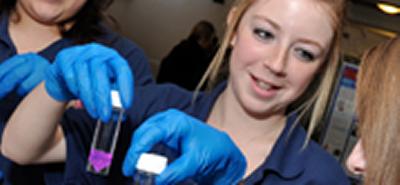Hospital-based classroom shortlisted for award

A scheme which improves young people’s health through education and first-hand experience of scientific laboratories has been shortlisted for a prestigious award.
LifeLab Southampton is an innovative educational intervention which shows school pupils how their diets and lifestyles lay the foundations for a healthy life, and how their own health is linked to the health of children they may have in the future.
Secondary school pupils (aged 11 to 14 years old) from Hampshire are invited into the University of Southampton laboratories based at the Nutrition Biomedical Research Unit (BRU) at Southampton General Hospital or the Science Learning Centre to take part in active, on-going research.
Since it was set up in 2008, more than 300 pupils have benefited from the experience and now the scheme has been shortlisted for a Social Innovator of the Year award by the Biotechnology and Biological Sciences Research Council.
Mark Hanson, Director of the Institute of Developmental Sciences and of Human Development and Health at the University of Southampton, says: “There is urgent need to promote healthy lifestyles in young people in order to prevent chronic diseases in them and in their children. Education can change attitudes, alter health-related behaviours and increase health literacy in young people.
“LifeLab aims to give pupils an authentic setting in which to engage with scientific principles and health messages. By enabling them to understand the science underlying how lifestyle choices at an early age can drastically affect their health and that of their future children’s, we empower them to make healthier lifestyle choices now and engage with scientific issues in ways that would otherwise not be possible.”
LifeLab is tailored to reach pupils of all abilities. Modules of work have been developed, encompassing pre and post-visit lessons which introduce and build on the work the pupils carry out during their LifeLab visit. All the lessons have explicit links to the national curriculum.

During their LifeLab visit, the pupils meet research scientists at all levels and have the opportunity to find out about their work and their lives. Their experiments and activities include measuring the carotid artery intima-media thickness; measuring bone composition and muscle strength; and extracting their own DNA to see how lifestyle can affect gene function.
One of the schools to have benefited is Bitterne Park School in Southampton. Head of Science Kathryn Moles says: “By being involved with LifeLab, pupils’ learning was brought to life. They took away some powerful messages about healthy lifestyles and the consequences for their and their children’s health of habits formed when they are young. Being able to meet and talk to scientists helped them understand how science really works, and this led them to consider careers they were not previously aware of or had ruled out.”
Kathryn Woods-Townsend, LifeLab manager, adds: “LifeLab activities emphasise the excitement of scientific discovery, making the pupils part of the investigative team. By helping them to gain familiarity with the culture of science, they feel more at home with biological issues which relate to themselves and their lifestyle. We are delighted to be shortlisted for this award and believe our innovative approach is an exciting and powerful way of helping young people to take ownership of their health.”
LifeLab is a unique collaboration between the University of Southampton, the Science Learning Centre South East, the Medical Research Council Lifecourse Epidemiology Unit, University Hospitals Southampton NHS Trust, Southampton City Council and local schools.
The long-term goal is to provide all students in Southampton (boys and girls of all abilities) with a permanent classroom at Southampton General Hospital, where they can experience and contribute to world-class scientific research. LifeLab enhances rather than replaces the school experience and enables pupils to appreciate the relevance of modern science.
The Biotechnology and Biological Sciences Research Council Innovator of the Year Awards 2012 will take place on 28 March in London.